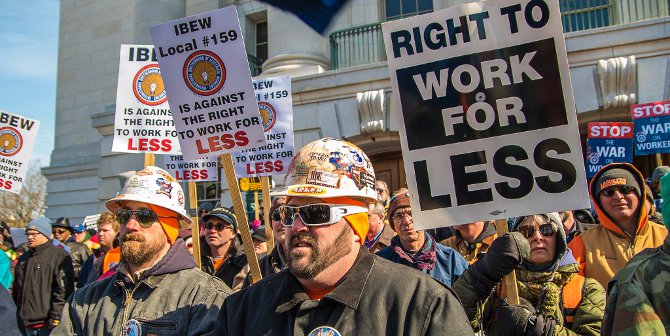According to the US Department of Labor, Labor Day is a “yearly national tribute to the contributions workers have made to the strength, prosperity, and well-being of our country.” With this in mind, USAPP Managing Editor Chris Gilson has collated a topical selection of USAPP’s recent articles on work, workers’ rights, and unions.
African Americans respond to labor market discrimination by searching more widely for jobs, which in turn hurts their wages.

 How do women and minorities respond to discrimination in hiring? In new research, Devah Pager & David S. Pedulla find that African Americas search more broadly for jobs because of their experience of racial discrimination, while women search more narrowly because of the often highly segregated nature of occupations by gender. They write that African Americans’ broader job search strategies are often associated with lower wages and poorer career trajectories, and that women’s narrower job search helps reinforce existing patterns of gendered labor market inequality.
How do women and minorities respond to discrimination in hiring? In new research, Devah Pager & David S. Pedulla find that African Americas search more broadly for jobs because of their experience of racial discrimination, while women search more narrowly because of the often highly segregated nature of occupations by gender. They write that African Americans’ broader job search strategies are often associated with lower wages and poorer career trajectories, and that women’s narrower job search helps reinforce existing patterns of gendered labor market inequality.
Landscapes of luxury in the rural US depend on the recruitment of low-wage and often undocumented Latino workers


 The last two decades have witnessed a dramatic growth in low-wage Latino and Latina immigrants, both documented and undocumented, finding employment and settling permanently in the United States. This process represents a key example of how globalization is transforming the U.S. economy and society. Of particular interest to scholars has been the diversification of Latino immigrant destinations, as a growing number of communities with no recent history of immigrant presence have witnessed rapid growth in immigrant residents. In new research, Lise Nelson, Laurie Trautman, and Peter B. Nelson argue that rural gentrification represents an important but overlooked ‘pull factor’ in the expansion of new Latino immigrant destinations in the rural United States. Their research reveals the process through which employers’ recruited workers to these geographically isolated locales, and how the gentrification boom witnessed in these places is supported by highly flexible immigrant labor regimes.
The last two decades have witnessed a dramatic growth in low-wage Latino and Latina immigrants, both documented and undocumented, finding employment and settling permanently in the United States. This process represents a key example of how globalization is transforming the U.S. economy and society. Of particular interest to scholars has been the diversification of Latino immigrant destinations, as a growing number of communities with no recent history of immigrant presence have witnessed rapid growth in immigrant residents. In new research, Lise Nelson, Laurie Trautman, and Peter B. Nelson argue that rural gentrification represents an important but overlooked ‘pull factor’ in the expansion of new Latino immigrant destinations in the rural United States. Their research reveals the process through which employers’ recruited workers to these geographically isolated locales, and how the gentrification boom witnessed in these places is supported by highly flexible immigrant labor regimes.
Giving migrants temporary legal status can help them into work and increase their earnings.

 Last year, President Obama used an executive action to delay deportation and grant work permits for unauthorized immigrant parents, an action which has subsequently been halted by the courts. In new research, Pia M. Orrenius and Madeline Zavodny examine the effects that this type of temporary relief has on the migrant labor market. By studying the labor market outcomes of Salvadoran migrants, they find that granting temporary legal status leads to higher earnings among men and a higher employment rate among women.
Last year, President Obama used an executive action to delay deportation and grant work permits for unauthorized immigrant parents, an action which has subsequently been halted by the courts. In new research, Pia M. Orrenius and Madeline Zavodny examine the effects that this type of temporary relief has on the migrant labor market. By studying the labor market outcomes of Salvadoran migrants, they find that granting temporary legal status leads to higher earnings among men and a higher employment rate among women.
Workers need to question whether right to work laws are promoting their rights or stripping them away
 In March 2015, Wisconsin controversially became the 25th state to adopt ‘right to work’ legislation which bans unions from collecting dues from non-unionized workers. Jonathan E. Booth looks at the history and background of right to work laws, which are often framed by those who support them as being pro-job and pro-growth. He argues that the evidence to support these claims is largely spurious, and that politicians, such as Wisconsin’s Governor, Scott Walker, have tended to use right to work laws in order to further their own political aspirations by weakening unions’ political power.
In March 2015, Wisconsin controversially became the 25th state to adopt ‘right to work’ legislation which bans unions from collecting dues from non-unionized workers. Jonathan E. Booth looks at the history and background of right to work laws, which are often framed by those who support them as being pro-job and pro-growth. He argues that the evidence to support these claims is largely spurious, and that politicians, such as Wisconsin’s Governor, Scott Walker, have tended to use right to work laws in order to further their own political aspirations by weakening unions’ political power.
Why everyone does better when employees have a say in the workplace

 In February 2014, workers in a Tennessee Volkswagen plant voted against union representation, something that William Lazonick and Tony Huzzard say is unfortunate. They write that to compete on the world stage, a strong employee voice in the workplace matters. Using case-studies of automotive companies in Germany, Sweden and the U.S., they argue that compromises between the financial interests of shareholders and the productive interests of employees can lead to considerable success. High-performance workplaces, characterized by “high road” jobs in which productivity improvements and pay increases go hand in hand, are critical to sustained competitive advantage.
In February 2014, workers in a Tennessee Volkswagen plant voted against union representation, something that William Lazonick and Tony Huzzard say is unfortunate. They write that to compete on the world stage, a strong employee voice in the workplace matters. Using case-studies of automotive companies in Germany, Sweden and the U.S., they argue that compromises between the financial interests of shareholders and the productive interests of employees can lead to considerable success. High-performance workplaces, characterized by “high road” jobs in which productivity improvements and pay increases go hand in hand, are critical to sustained competitive advantage.
Union members are more likely to give to charity, and to give more when they do.

 While union membership has benefits to workers themselves, could these benefits have spill over effects that are also a boon to society? Jonathan Booth and Mark Williams look at the effects that union membership has on charitable giving, and find that being a union member makes people 5 percent more likely to give to charity, and also to give 30 percent more than non-union members. These findings, they argue, may have important implications for society in a time of declining union membership.
While union membership has benefits to workers themselves, could these benefits have spill over effects that are also a boon to society? Jonathan Booth and Mark Williams look at the effects that union membership has on charitable giving, and find that being a union member makes people 5 percent more likely to give to charity, and also to give 30 percent more than non-union members. These findings, they argue, may have important implications for society in a time of declining union membership.
Government workers are able to gain better pay in attractive areas like California and Manhattan, especially if they are unionized.

 In recent years, many commentators have expressed growing concerns over levels of public sector pay. While citizens who are unhappy with high pay levels in the public sector could move elsewhere, thus affecting the tax base, in some areas this out-migration is much less likely than others. Jan K. Brueckner and David Neumark write that ‘high amenity’ areas such as California, for its climate, or Manhattan, for its productive density, are more attractive to citizens, which reduces the likelihood that they will vote with their feet over public sector pay, thus leading to better paid government workers in those areas.
In recent years, many commentators have expressed growing concerns over levels of public sector pay. While citizens who are unhappy with high pay levels in the public sector could move elsewhere, thus affecting the tax base, in some areas this out-migration is much less likely than others. Jan K. Brueckner and David Neumark write that ‘high amenity’ areas such as California, for its climate, or Manhattan, for its productive density, are more attractive to citizens, which reduces the likelihood that they will vote with their feet over public sector pay, thus leading to better paid government workers in those areas.
 Book Review: Social Insurance, Informality and Labor Markets: How to Protect Workers While Creating Good Jobs
Book Review: Social Insurance, Informality and Labor Markets: How to Protect Workers While Creating Good Jobs
Social Insurance, Informality and Labor Markets studies social protection programs in Latin America and explores one of the most pressing issues of the region’s attempts to provide a safety net to its citizens: whether social programs discourages participation in the formal sector. Chris McLachlan writes that the evidence outlined in this book will have important implications for policy development globally.
Featured image credit: Light Brigading (Flickr, CC-BY-NC-2.0)
Shortend URL for this post: http://bit.ly/LaborDy




